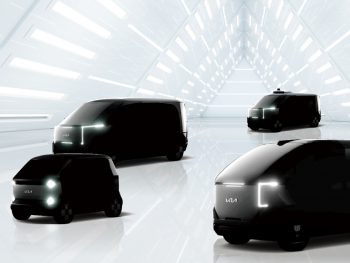Kia to mass-produce electric PBVs for ride-hailing and delivery firms
Kia has spearheaded plans to enter the electric ‘purpose-built vehicle’ (PBV) market for delivery and ride-hailing firms with the start of construction on a new dedicated plant.

The new plant will start mass-production of battery-electric PBVs in second half of 2025
Located in Gyeonggi Province, South Korea, the plant will be operational from the second half of 2025 and will have a yearly capacity of 150,000 units.
So-called PBVs play a big role in Kia’s ‘Plan S’ strategy, revealed in 2020 and setting out how the brand will transition to EVs and mobility solutions by 2025.
The first model in the company’s dedicated PBV line-up will be a midsized vehicle, designed to meet delivery, ride hailing and business-to-business (B2B) needs through its load structure and interior space. It will be based on the ‘eS’ dedicated skateboard platform for battery-electric PBVs, which enables the use of various types of vehicle bodies.
This will be followed by large-sized PBVs – targeted at logistics, fresh food delivery, multi-seat shuttles and mobile offices and stores – plus small-sized PBVs and mid-sized robotaxis using autonomous driving technology.
The new PBV facility will be built as an eco-friendly plant that applies future innovative manufacturing technologies – such as the ‘cellular (or cell) method,’ which allows vehicle production based on diverse customer demands. It will also minimise carbon emissions by operating a ‘dry booth’ that uses natural light during the painting process of vehicle manufacturing, reducing carbon emissions by about 20% compared to existing factories.
The opening ceremony for the new plant also saw Hyundai Motor Group announce its aim to become one of the world’s top three EV manufacturers by 2030 through the combined sales of Hyundai, Kia and Genesis electric models.
The group also revealed plans to significantly expand the annual EV production in Korea to 1.51 million units and global volume to 3.64 million units by 2030, supported by an investment of KRW 24 trillion (around US$18bn / €17bn / £14bn).
In 2030, the group will have a total line-up of 31 EVs, including Kia’s flagship EV9 SUV due this year and the Hyundai Ioniq 7 due in 2024.
Kia president and CEO Ho Sung Song said: “Our focus is to enhance the competitiveness of the entire electric vehicle ecosystem, including research and development, production, and infrastructure, and to lead the way in driving change and innovation in the new global automotive industry.”

